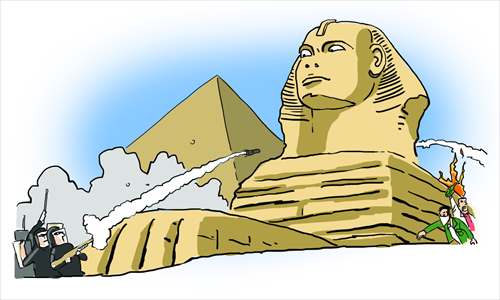Egyptian public suffering as political fighting continues to divide nation

Egypt's electoral commission announced Tuesday that voters had approved the new constitution.
Figures show that the constitution was back by 63.8 percent of voters in a referendum, although only a third of the electorate voted. The new constitution, even before adoption, has already caused controversy across a country gripped by often violent protests.
It has been a year since Egypt's revolution. However, the revolution has brought to the country not joy and hope, but a complex power struggle among political factions.
From parliamentary elections to the veto to the election result, from former president Hosni Mubarak's sentencing to top judges condemning current President Mohamed Morsi's power grab, fighting and chaos have become keywords for Egyptian politics. The newly approved constitution is not the end of the political fight.
From a series of battles, we can see that political fracture is the fundamental reason for Egypt's chaos.
Egypt's revolution overthrew Mubarak, who ruled the country for almost 30 years and opened the door for Egypt's democratic process. The Muslim Brotherhood and Salafi have won the parliamentary and presidential elections, while the April 6 Youth Movement and Mohamed El-Baradei, who led the revolution, did not get the share of the political positions that they had expected.
This has added to the friction between new liberals and the ruling Muslim Brotherhood and threatened another revolution.
Meanwhile, Egypt's second revolution still isn't over. There's still entanglement between Morsi's regime and that of Mubarak. The main dispute between liberals and conservatives is how to deal with the former administration.
The debate on Islam and secularism is another factor. Both the Muslim Brotherhood and the liberal El-Ghad Party have promoted Islam and conservatism as the country's political direction.
Last but not least, although the chaos in Egypt was mainly caused by discrepancies in political reconstruction, the negative impact of the military in this process cannot be neglected. In fact, the military is more like the regent.
Political fractures have normalized political fighting in Egypt and divided the country. The current dispute has been the focus of the new constitution, and the Muslim Brotherhood wants to make Islam the basis of the Egyptian constitution.
There are a few directions open for Egypt's political reconstruction. Former presidential candidate and prominent opposition leader Hamdeen Sabahy said that revolutionists deserve a constitution "that is worthy of the revolution and the dignity of its martyrs." This also fits political reconstruction.
Breaking the old order will create more freedom and welfare for citizens, but will not result in a simple political power transition. However, what the ruling group and the opposition parties have done goes against the notion of revolutions.
It's also necessary that all political parties in Egypt have the same will. Egypt belongs to its citizens rather than individual parties.
A complicated election procedure and factional fighting make the election process cumbersome. What the Egyptian public has seen is nothing but a show put on by politicians.
Egypt needs strategic political integration and a consensus that goes far beyond the interests of different political parties, so that it can get out of the current political impasse.
In addition, the reconstruction process should be democratic-oriented. The balance of power is the major characteristic of democracy and also a way for Egypt to get out of its current dilemma.
In the new constitution, the power of the president is still what the public is concerned about and the breaking point for future political fighting. The low voting rate of the electorate shows the public's fatigue toward elections.
As Egypt is suffering an economic slowdown, both the ruling group and opposition parties should seek consensus for international aid, which requires compromise from both sides.
Chaos is the stage that a revolution must go through and the cost that Egypt and its public need to pay. But there's no need to pay for the political fighting that goes against the spirit of revolution.
The author is an associate professor of the Institute of International Relations at Shanghai Academy of Social Sciences. opinion@globaltimes.com.cn